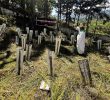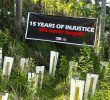The soldier held on to Allan’s sideburns and didn’t reply. Instead, he continued to drag Allan. He brought him to where the rest of the soldiers were. Allan slumped to the ground because he had no more strength on his knees.
He tried to note the names of the soldier who beat him up but among the 20 soldiers who arrived in their sitio that day, no nameplate was visible. Either the nameplates were removed or soldiers covered their chests with bullet bands or sarongs. A badge that the soldiers were wearing, however, identified them with the 28th IB (Infantry Battalion) of the Philippine Army.
When Jenalyn continued to berate the soldiers for hurting her husband, one of the soldiers told her that what happened to him was their own fault. The soldier said he was tired of defending the Lumads against the NPA. He said the Lumads were not very cooperative in providing them with information needed to quash the NPA.
After a few minutes, two of Jenalyn’s neighbors arrived with their small children. They also asked the soldiers to release Allan. After about half an hour, the soldiers relented.
Allan reported what happened to him to the purok chairperson, Oraya Bansayluan the following morning. He asked Bansayluan and Rey Guimbuloy, the president of their local Lumad organization, to accompany him to Mangayon barangay captain Ramon Diaz to report the incident.
At the barangay hall, Diaz contacted Compostela municipal mayor Reynaldo Castillo, who was still in Davao City. After some time, the mayor called Diaz, who told the mayor about what happened to Allan. Castillo told Diaz to have Allan come to his office the next day for lunch.
Guimbuloy was able to contact officers of the southern Mindanao regional Lumad group Pasaka that afternoon. The officers told him to bring the group to the town of Compostela where they would be picked up and brought to Davao City. The group arrived in Davao on May 5. They went to the human-rights group Karapatan where they asked for help in filing cases against the soldiers before the Commission on Human Rights.
They also visited different radio and television stations to let the people know what was happening in their area. But afraid that his wife might give birth, Allan asked to go back home.
The three reached sitio Bermuda on May 10. Bansayluan and Guimbuloy went back to work on their fields the next day but Allan, who was still sore from the scratches and all the bruises, opted to rest one more day.
In the morning of the 12th, just as Allan was preparing to go back to work on his fields, Jenalyn’s labor pains started. Allan called his mother who helped deliver the baby.
Vermon was born at six in the morning.
Allan was happy but was also a bit apprehensive. The birth meant he had to stay away from his fields one more day to tend to the needs of the four other children and to let his wife rest.
But only a few hours after Vermon was born, government soldiers arrived in the village. Allan’s neighbors told him that it was the same group that was there the week before. Those who beat up Allan was also there. All of them still had their nameplates covered or removed.
Indigenous Peoples









